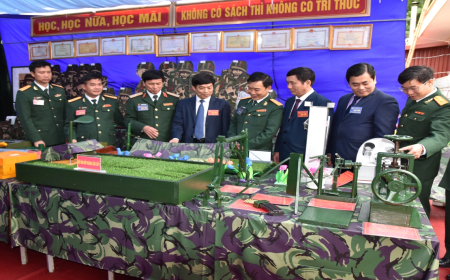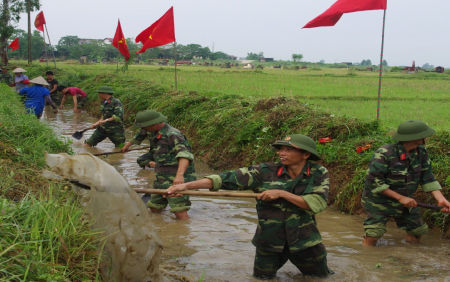The district of Yen Phong combines socio-economic development with defence-security consolidation
Yen Phong district is located in the West of Bac Ninh province which belongs to the Red River Delta. It has a developed system of roads, such as the National Highways 1A, 18 and 3B, the Provincial Roads 295, 286, 276, and 277, creating a favourable condition for its socio-economic and cultural development and trade exchange with localities both inside and outside the province. Together with the process of national industrialisation and modernisation, Yen Phong has quickly transformed its economy from intensive agriculture into industry and services with many industrial and urban zones and hundreds of large-scale and small-scale businesses, thereby creating a large number of employments and changing the district’s look.
 |
An exhibition during the District Military Party Congress for
the 2020-2025 tenure |
Under the Party’s guidelines on combining socio-economic development with defence-security consolidation, the District Party Committee, People’s Council, and People’s Committee have focused their leadership and direction on taking measures for accelerating economic growth and building the all-people national defence, the people’s security, and the defensive zone. The district has implemented many projects and programmes on cost-effective agricultural development and large-scale farming. It has step by step established a number of safe vegetable production and high-level flower cultivation zones. The National Target Programme on building new-style countryside has been actively executed with the total funding of 1,300 billion VND. Up to now, all 13 communes of the district have met the criteria of new-style countryside. Industry and cottage industry have witnessed fairly rapid growth and accounted for a large proportion of the district’s economic structure. In 2020, they are estimated to achieve the turnover of over 1 million billion VND, with an average growth rate of 17.8%. Services and trade have continued to develop quickly, with the average growth rate of over 14.6% per annum. Infrastructure, particularly inter-district, inter-commune, and rural roads and urban areas have been developed and modernised.
Education, healthcare system, culture and society have been maintained and developed. Up to now, all 48 schools of the district have satisfied the national standards. The quality of mass education has been improved. Public healthcare system has been enhanced. All communes of the district have met the national health criteria. It has 6 doctors per 10,000 people. Reproductive health services, family planning programme, and children protection and education have been ensured frequently. Cultural activities, information, and propagation have always followed the district’s political task. Significance has been attached to preserving and promoting the values of Quan Ho folk music (2 villages of original Quan Ho and 28 villages of practical Quan Ho have been recognised by the Provincial People’s Committee). Social policies have been implemented in an open, democratic manner, thereby cementing the people’s faith in authorities, making contributions to building a firm “posture of people’s hearts and minds.”
The good thing is that the combination of socio-economic development and defence-security consolidation has been more clearly expressed and proved more effective. That combination has been mentioned in the district’s guidelines, plans, programmes, and projects. It should be noted that the district has made investments in constructions for both economic development and defence-security consolidation. In recent years, the district has invested over 1.5 billion VND in constructing 1 food cellar, 1 weapons cellar, and combat works within its defensive zone. The district’s armed forces have strictly maintained combat readiness, actively performed the military-defence work, and cooperated with other forces in protecting the area. The work of building, managing, and training the militia and self-defence force and the reserve force, military call-up, and military entrance exam have been put in order. The organisation of district-level defensive zone and commune-level defensive combat exercises has been in accordance with the plan and reality, thus contributing to raising local party committees and authorities’ awareness and responsibility and especially the advisory role of military and public security offices, sectors, and unions towards the defence-security task.
However, in addition to advantages in developing industry, urban areas, and services, the district has been confronted with difficulties and challenges. Its economic growth is rapid, but its infrastructure has yet to be synchronous. The restructuring of its agriculture has been slow. Large-scale production zones have been a small number. Site clearance for industry and cottage industry has been at a slow speed. The settlement of environment pollution in handicraft villages and industrial clusters has yet to be complete. Crimes, gambling, narcotic trafficking, and traffic accidents have not been prevented opportunely yet.
In order to facilitate Yen Phong’s rapid and sustainable development, the District Party Committee, People’s Council, and People’s Committee have raised the awareness and responsibility of all cadres, party members, and people, particularly the key ones at all levels towards the two strategic tasks and the combination of socio-economic development and defence-security consolidation, thereby achieving a consensus amongst them, avoiding the situation in which only importance is attached to economic development or insufficient regard is paid to national defence and security. Consideration has been given to enhancing the quality and effectiveness of defence and security education for key cadres at all levels, sectors, and all citizens. Focuses of defence and security education have been placed on introducing local political task and combining full-time courses with traditional festivals, dialogues, cultural and artistic exchange programmes, and local armed forces’ activities in accordance with each group of receivers. The district has improved the quality and effectiveness of disseminating defence-security task via mass media, thus making contributions to building the all-people national defence, the posture of all-people national defence associated with the posture of people’s security, and especially a firm “posture of people’s hearts and minds.” It has cemented the all-people great unity block and promoted the people’s politico-spiritual factor in the national defence consolidation and the building and operation of the defensive zone.
To effectively combine socio-economic development with defence and security consolidation, the district has attached great value to investing in “dual-use” works and projects within the general relationships between economic development and social, cultural development as well as between socio-economic development and national defence and security in both long and short terms. Regarding agriculture, the district has directed offices and sectors to synchronously adopt measures for improving productivity and economic value, raising farmers’ income, ensuring food security, the people’s demand, and on-the-spot logistics accumulation capacity for defence-security task and the defensive zone’s operation. Emphasis has been placed on establishing large-scale production zones, making best use of agricultural land, fostering hi-tech farming, developing the network of material and technical services for purchasing, processing, preserving, and consuming farm produce, mechanising agricultural production, and stepping up large-scale animal husbandry.
Concerning industry, cottage industry, and construction, the district has given priority to harmoniously developing the industrial zones of Yen Phong I, Yen Phong II-C, Vsip Bac Ninh, industrial clusters of Dong Tho and Yen Trung - Dong Tien, cottage industry zone of Dong Phong commune, and handicraft villages, protecting the environment, and enhancing labour restructuring. Focus has been placed on completing the Plan on the Urban Area of Cho and its adjacent areas towards 2030, with a vision towards 2050 and the Detailed Plan on the general service, culture, and tourism urban area of Bac Ninh Five Build (100 ha). Those projects and plans have been reviewed, adjusted, supplemented by military offices so that they would be capable of serving the building of the defensive zone and production when the district is transformed from peacetime into wartime. Moreover, services have been developed rapidly and diversified to achieve the growth rate of 15% and greater per annum. Priority has been given to developing private businesses, wholesale markets, and general trading markets and changing the methods of managing markets and the network of purchasing, processing, preserving and consuming products. Due regard has been paid to taking measures for increasing budget, saving public expenditure, making investments in constructing works within the defensive zone and headquarters of military offices at all levels. Besides, due attention has been paid to implementing social policies, especially for the people with meritorious services to the revolution, mobilising all possible resources for improving beneficiaries’ income and life, and effectively executing the programme on sustainably reducing poverty rate. More investments have been made in comprehensively developing cultural and social fields, raising the quality of human resources, restoring cultural tradition, and fighting against evil cultural products. The district has formulated a master plan for traffic system, particularly roads in the urban areas, roads connecting industrial zones and clusters with combat bases and logistics bases, and inter-commune, inter-village roads so as to serve socio-economic development and defence-security task in both peacetime and wartime.
 |
The work of mass mobilisation during a training course intended for
the reserve force |
In addition to fulfilling the preset targets and tasks, the district has concentrated on making the armed forces strong comprehensively and capable of protecting the Party, the State, the people, and the socialist regime. The standing force, the militia and self-defence force, and the reserve force have been built and trained under the regulations. In this regard, military training has been closely combined with political, legal education and the work of mass mobilisation. Importance has been attached to renewing methods of mass mobilisation and promoting the role of all forces in the mass mobilisation work, thereby contributing to maintaining political security and social order and safety. Due regard has been paid to well implementing the regulation on cooperation between the Military and the Public Security Force under the Government’s Decree 03/2019/NĐ-CP, dated September 5th, 2019 in the settlement of complex cases relating to political security and social order right at grass-roots level. Consideration has been given to making political bases capable of well handing situations, preventing and foiling the hostile forces’ plots and artifices in order to maintain politico-social stability in the area.
Bringing into the tradition of Kinh Bac, the district’s Party Organisation, Authority, armed forces, and people will devote efforts to facilitating economic development, maintaining socio-political stability, and consolidating national defence and security so as to successfully fulfil the task of national construction and protection together with the province of Bac Ninh.
NGUYEN CHI CUONG, Deputy Secretary of the District Party Committee, Chairman of the District People’s Committee